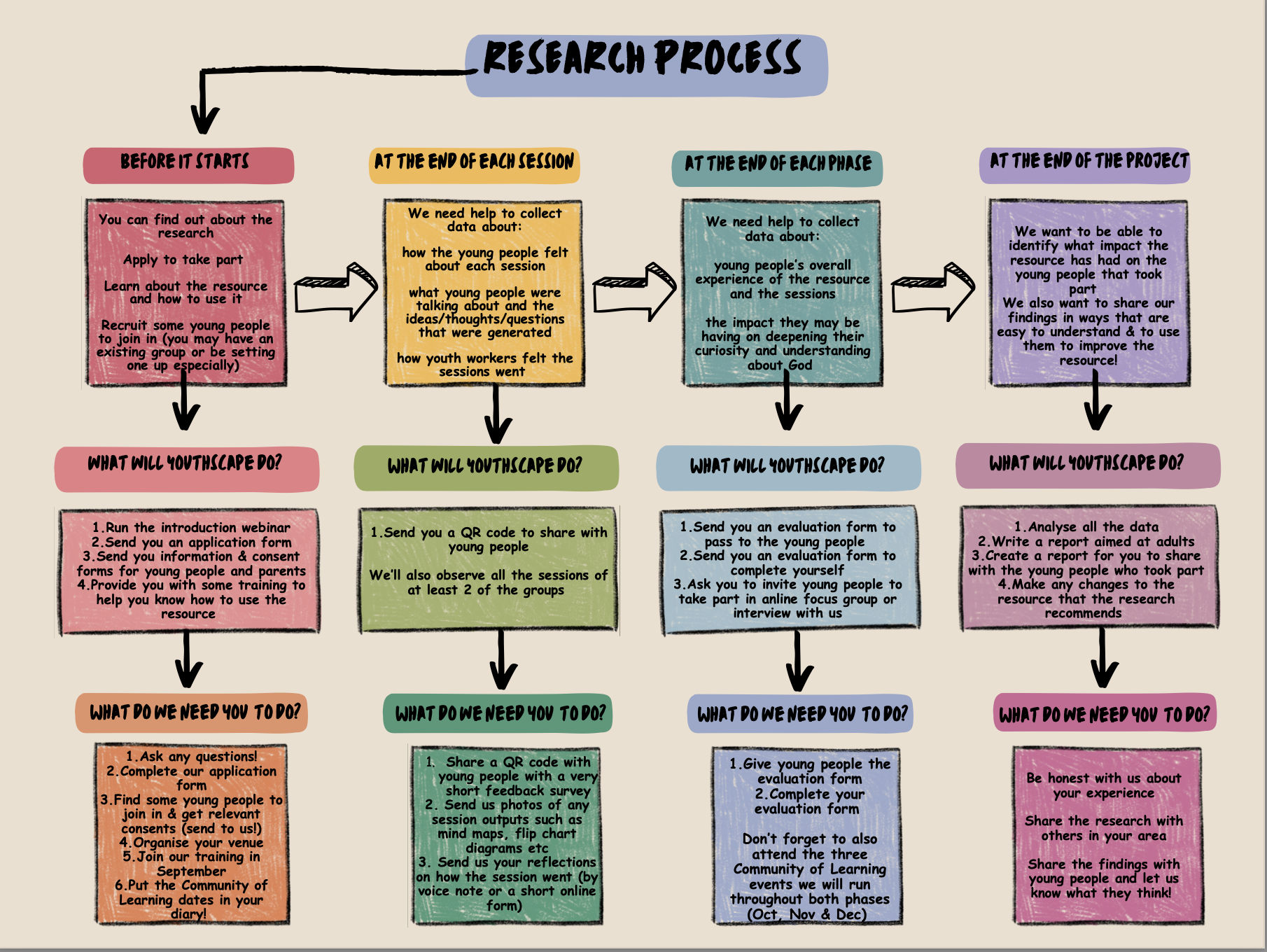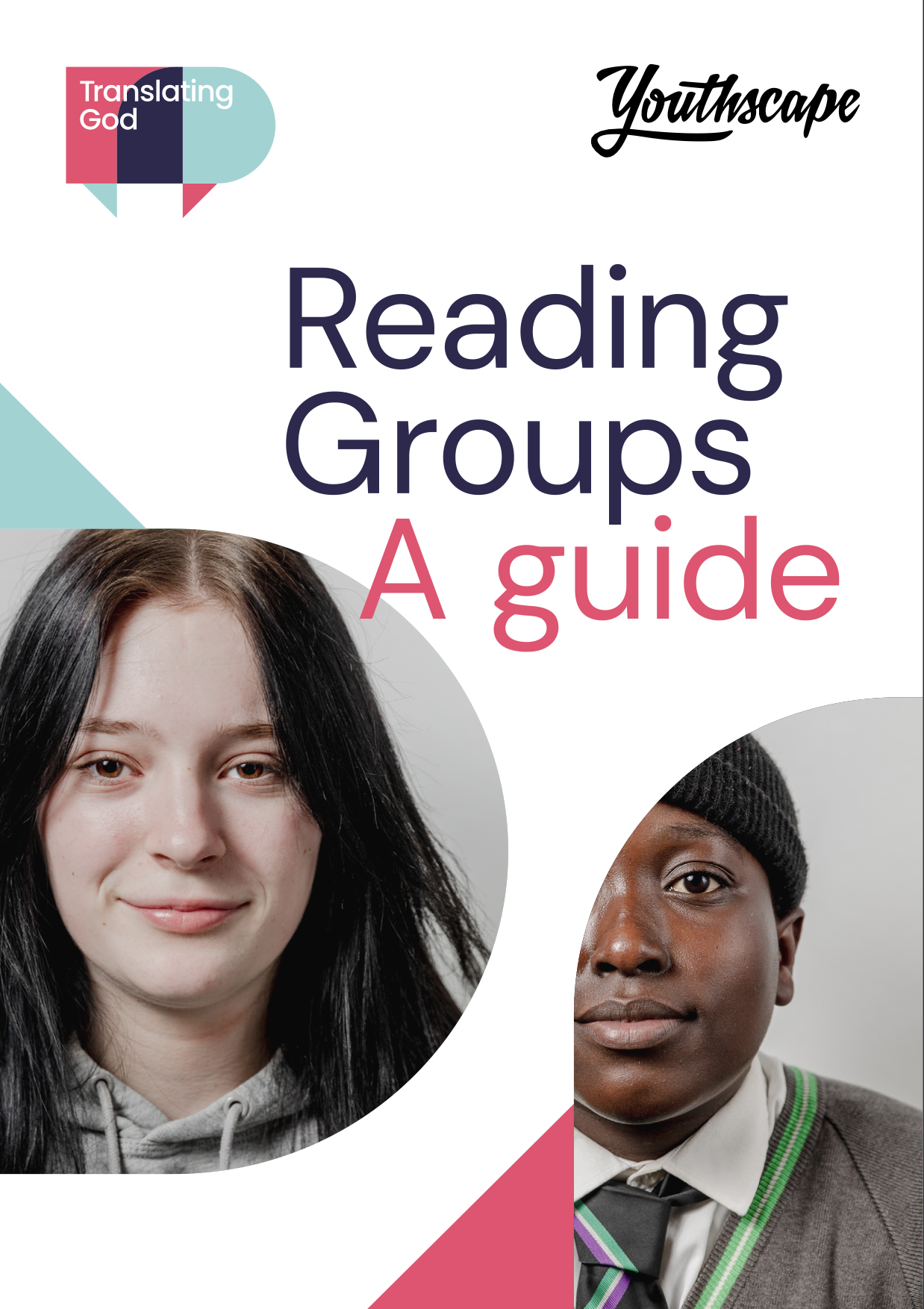Where you will find all you need for your research journey with the Translating God Reading Resource.
Information About the Research Project
Research Overview
At present, you are the only people to have access to the reading guide! Before we make the resource available to all, we are interested to see how it lands with young people, understand your experiences as facilitators, and, ultimately, evaluate how well it achieves its aims. We are not looking at your performance as facilitators in relation to either your delivery or the spiritual journey of the young people. This is where you find all the information you need for this research journey!
Using The Resource and Collecting Data
See the flowchart below for a visual overview

- Use the resource with a group of 4-8 young people of secondary school age with whom you have mutual trust, curiosity, and openness (plus some knowledge and discernment) [you must gain informed consent from both young people and their parent/carer and we must receive the signed forms prior to you beginning].
- Use the resource twice with your group:
- The first time using Mark 10:46-52 (Jesus’ healing of Bartimaeus)
- The second time using a passage of your choosing (see p21 of resource)
- Enable us to understand how the sessions are going by:
- Encouraging young people to complete a short survey at the end of each session
- Session 1: https://youthscape.typeform.co...
- Session 2: https://youthscape.typeform.co...
- Session 3: https://youthscape.typeform.co...
- Session 4: https://youthscape.typeform.co...
- QR codes for the young people can be found in the PPT here.
- Completing a short survey as facilitators at the end of each session
- Session 1: https://youthscape.typeform.co...
- Session 2: https://youthscape.typeform.co...
- Session 3: https://youthscape.typeform.co...
- Session 4: https://youthscape.typeform.co...
- QR codes for facilitators can be found in the PPT here.
- Encouraging young people to complete a survey at the end of each phase - https://youthscape.typeform.co... (QR Code)
- Completing a survey as facilitators at the end of each phase - https://youthscape.typeform.co... (QR Code)
- Sending us photos of session outputs e.g., key words on flipchart paper [please upload these via your individual dropbox link - this will have been sent to you by email, get in touch if you need it resending] you can also WhatsApp us on 07351568363.
- Attend at least one Community of Learning session (see dates below)
- Encouraging young people to complete a short survey at the end of each session
Ethics
- All projects carried out at Youthscape’s Centre for Research are reviewed by two members of our Ethics Board. Before being able to take part in the project, all those involved – facilitators, young people, and parents/carers - must provide informed consent (information sheets and consent forms emailed to lead facilitator).
- Once the consent forms have been signed – please upload them into Dropbox using the link emailed to the lead facilitator. Once they are all complete, please confirm this with us and begin your sessions!
Community of Learning
- We have scheduled in three community of learning sessions. These will all take place between 12:30 and 1:30pm over Zoom. Please attend at least one.
Monday 18th November
https://us02web.zoom.us/j/84664291322?pwd=uDJiyHaI9MDLi1UNdQgdRahNg3CTFc.1
Tuesday 14th January
https://us02web.zoom.us/j/84664291322?pwd=uDJiyHaI9MDLi1UNdQgdRahNg3CTFc.1
Monday 3rd March
https://us02web.zoom.us/j/87293557927?pwd=mcMSCWpSVrUDgYgdSYLnTjYjgxUsE3.1
Contacting the Research Team
- If you have any questions, please do not hesitate to contact the research team (Hannah and Gemma) by emailing research.team@youthscape.co.uk.
Information About Using The Resource

The Approach
- This reading guide stems from the Translating God project which include a series of focus groups in which young people were presented with a scripture and asked to respond freely and openly. You can see a dramatized version of one of these groups here: https://ccx.org.uk/content/multiply-2024-rachel-gardner/ (pp6-9).
- The approach included within this guide retains the open quality of the research session while adding space for young people to learn more through their reading. This combination is inspired by contextual Bible study, theological reflection, contemplative prayer, participative reading, and informal youth work. It offers a shift from the standard approach to Bible study, as outlined in table found in the appendices below (pp6-9).
Practical Tips
- This guide was written with 4-8 young people aged 14-18 meeting weekly in mind, but this can be adapted to suit your context.
- When setting up your reading group, you want to think about 6 key things (pp20-22):
- Asking the right questions rather than providing answers
- Allowing enough time for each stage
- Choosing passages which focus around stories
- Setting up the group carefully – age, rapport, size, and space
- Feeling able to gently correct factual misunderstandings
- Leaving some time between each stage of the reading process
- There are four types of questioning you might use – mirroring, deepening, connecting, and wondering (pp22-23).
The Sessions
- The four parts are: reading, learning, encounter, and response.
- Reading (pp25-27)
- Learning (pp29-30)
- Encounter – (pp 31-33 and additional notes around imaginative contemplation).
- Response (pp35-37)
You can’t go far wrong if you listen well, follow their lead, and see where you end up!

